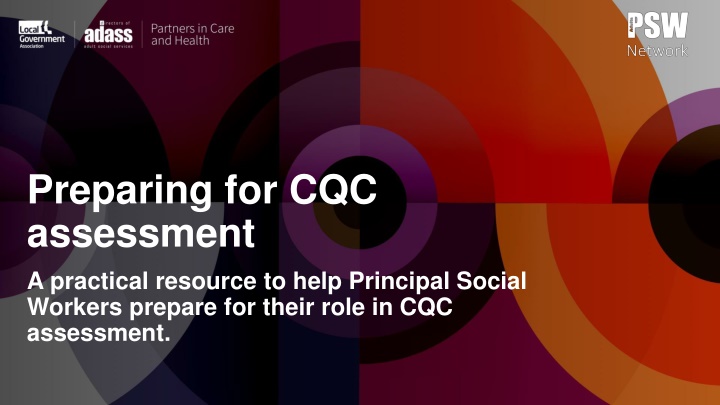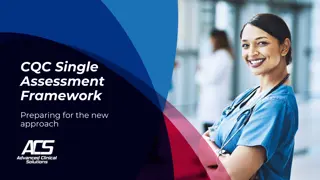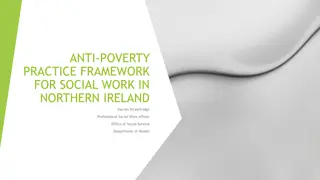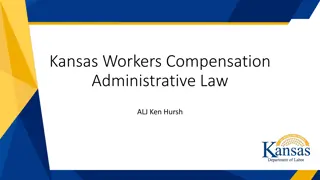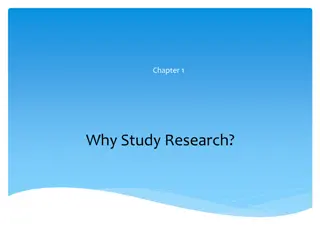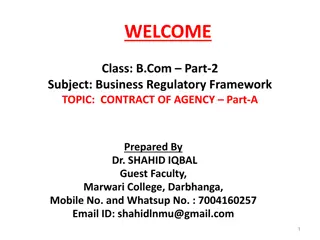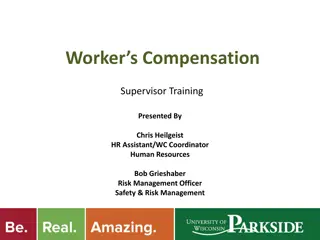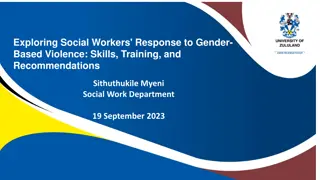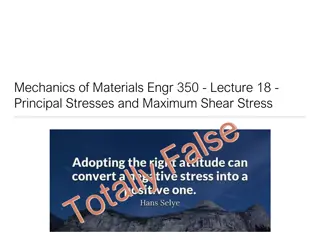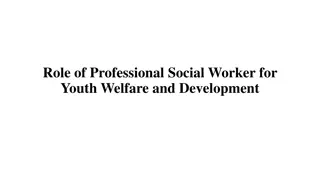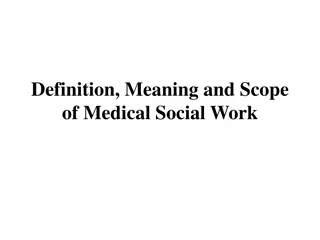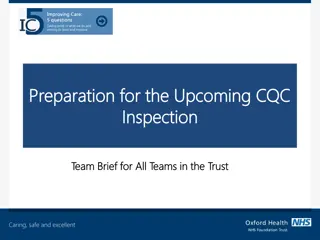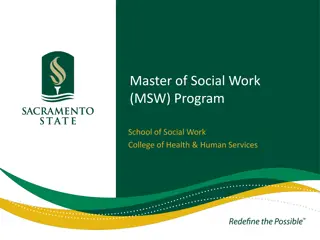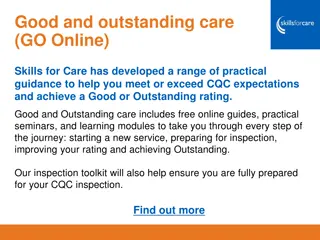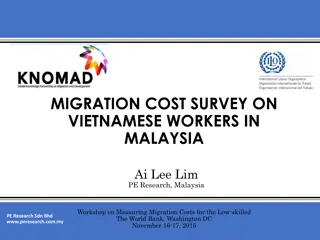Preparing for CQC Assessment: Practical Resource for Principal Social Workers
Principal Social Workers play a crucial role in the CQC assessment process, and this resource aims to support them in preparing effectively. Developed in collaboration with respected organizations, it focuses on quality assurance standards, anti-racist approaches, and resilience building. The program, funded by the Department of Health and Social Care, offers tools, techniques, and best practices for PSWs to excel in their role and make a positive impact on social work practice.
Download Presentation

Please find below an Image/Link to download the presentation.
The content on the website is provided AS IS for your information and personal use only. It may not be sold, licensed, or shared on other websites without obtaining consent from the author.If you encounter any issues during the download, it is possible that the publisher has removed the file from their server.
You are allowed to download the files provided on this website for personal or commercial use, subject to the condition that they are used lawfully. All files are the property of their respective owners.
The content on the website is provided AS IS for your information and personal use only. It may not be sold, licensed, or shared on other websites without obtaining consent from the author.
E N D
Presentation Transcript
Preparing for CQC assessment A practical resource to help Principal Social Workers prepare for their role in CQC assessment.
The Local Government Association and Association of Directors of Adult Social Services are Partners in Care and Health (PCH) working with well-respected organisations. PCH helps councils to improve the way they deliver adult social care and public health services and helps Government understand the challenges faced by the sector. The programme is a trusted network for developing and sharing best practice, developing tools and techniques, providing support and building connections. It is funded by the Department of Health and Social Care and offered to councils without charge. www.local.gov.uk/PCH
Foreword Never has being a Principal Social Worker (PSW) played such a pivotal role within our organisations, our systems, and our communities. Our role is full of opportunity to make significant impact on the quality of social work practice through our skilled and experienced leadership. We develop and implement quality assurance standards and champion anti-racist and culturally inclusive right-based approaches, ensuring that our interventions are informed by strengths-based, relational social work practice. The CQC process is our opportunity to shine, to showcase our passion for practice, to celebrate our workforce and to demonstrate why social work makes a life-changing difference to the people we serve.
But we also need to remember that all this work is hard, so it is essential that wherever we as PSWs find ourselves within the CQC assurance process, wellbeing, self-compassion and camaraderie empower and support us to enhance our resilience. The Adult PSW Network Leadership Team is proud to endorse this resource which will support us in our CQC assurance preparation journey. Sarah Range and Hannah Scaife Co-Chairs of the Adults PSW National Network Believe in yourself, you're enough. It's no mistake that you're the PSW at this time. Quote by Chris Erskine, PSW Lincolnshire County Council.
Background Principal Social Workers (PSWs) are a key contributor in the Care Quality Commission local authority assessment process and PCH has responded to demand from the sector to provide support to help PSWs to prepare. This resource forms part of that support which also includes a webinar: Role of Principal Social Worker in CQC Assessment and a publication Learning from the Care Quality Commission pilots for Principal Social Workers . The resource has been developed in response to conversations with, and feedback from PSWs, chairs of national and regional PSW networks and the Association of Directors of Adult Social Services regional leads. It has also been informed by learning from the pilot sites, and tools and techniques from the worlds of coaching and learning and development.
What PSWs want to know Several questions have emerged repeatedly through discussions with PSWs such as: What will the CQC lines of enquiry be? What will they ask me? What will be expected of me? Do the CQC know how much the role and remit of PSWs vary from council to council? What if I don t know the answer to a question? How do I articulate things that aren t going as well as I would like in a constructive way?
Aim of the resource This resource aims to address some of these questions and help PSWs prepare for their conversation with the CQC. It does this by: outlining the approach that the CQC takes to determine its lines of enquiry providing some guidance notes to help PSW think through how they may want to shape the focus of their conversation with the CQC based on their own specific role and remit providing a framework with reflective worksheets for PSWs to structure their thinking around the areas they want to cover in their conversation with the CQC. There is also a brief section covering self-compassion and personal resilience as a gentle reminder for PSWs to support their well-being throughout the process.
CQC lines of enquiry Figure 1 provides an overview of how the CQC develops its lines of enquiry and helps you as a PSW think about how you might shape the focus of your conversation with the CQC. Care Act and which areas it feels needs further exploration. Figure 1 CQC evidence gathering CQC Lines of enquiry As the CQC gathers and assimilates the evidence already available to it (national information) and the information it requests (information return) it will form a picture of how a local authority is delivering its adult social care duties under Part 1 of the 2014 Role and remit of PSW Focus of PSW conversation with the CQC
Your role and remit The local authority self-assessment should provide a clear and accurate reflection of how it is delivering adult social care. As a PSW you will want to familiarize yourself with the self-assessment and evidence to identify which key areas fit with your specific role and remit. Consider what is in your direct control, what is in the remit of others but over which you have some influence, and what is outside of your remit over which you have no control or influence. This will help you contextualize your role and remit for the CQC and maintain your focus and energy towards the things that you can do something about.
It will also help to mitigate the concerns you might have about the CQCs understanding of the role of PSWs being so varied from council to council and ensure you can have a conversation in a way that suits your individual circumstances. The advice from pilot PSWs was to be prepared to start your conversation with some scene setting for the CQC and use the opportunity provided by their broader lines of enquiry to talk about the main points you want to get across relevant to your role and the impact it is having. Remember wherever you sit in the organisation this is your opportunity to share your story of you as a PSW. What is working well, what isn t and what are you and or others doing about it.
Maximising energy and managing concerns Figure 2 is a model to help you think through how you might maximise your energy and manage your concerns in terms of what the CQC might ask you. Figure 2 It is an adaptation of the Learning Zone Model originally developed by psychologist Lev Vygotsky, and spheres of control adapted from Stephen Covey s (1989) The 7 habits of highly effective people.
It might be helpful to use the self-assessment as a basis for identifying: What is in your sphere of control? Which areas sit firmly within your role and remit? This is likely to include areas you feel most comfortable with and know a lot of the detail. What is outside your sphere of control but which you may have influence over? Which areas sit within the remit of other colleagues, but you are closely involved in? This is where you might feel a little stretched in terms of your knowledge and understanding and may need to familiarize yourself with some of the detail. What is outside your sphere of control and over which you have no influence? This might be where you feel concerned that the CQC will ask questions you don t know the answer to. Here you might just need to have a high-level understanding of an area of work but can t be expected to speak to it in any detail. In this situation it is helpful to direct the CQC to someone who does know about that area of work. Consider using this alongside Worksheet 1 to help shape what you would like to speak with CQC about.
Reflective worksheet 1: Identifying potential lines of enquiry What are the headlines from our self- assessment? What does the data, insight and evidence say? What areas might CQC want to explore further? / What does the organization think CQC will want to explore further? What are the areas that relate to my role and remit in particular? Which areas would I be confident talking to CQC about? Which areas would I be less confident talking to CQC about and what can I do to improve my confidence? Am I worrying about anything that doesn t sit within my role and remit? If so, what do I do about it? What are the key things I want to talk about in my conversation with the CQC? See the full worksheet online for more information.
Figure 3: A framework to structure your thoughts and responses What am I proud of? What do we do well here? What is the policy area strategy and or ambition it links to? What happens in practice? What do I/we do? How does it work here? What impact is it having on people lives and how do I/we know? What evidence do we have? What are the pressures and challenges? What are the plans for improvement?
A framework to structure your thoughts and responses explanation Figure 3 provides a framework to help you structure your thoughts and responses for your conversation with the CQC. Start by thinking about what you are proud of or what works well in your area of work and then ask yourself: What is the policy area strategy and or ambition it links to? What happens in practice? What do I/we do? How does it work here? What impact is it having on people lives and how do I/we know? What evidence do we have? What are the pressures and challenges? What are the plans for improvement?
In more simple terms you could think about it as a Plan Do Study Act cycle. Preparing your response in this way helps to demonstrate how plans translate into practice and how practice make a difference to people s lives as well as the extent to which feedback is gathered and used to provide evidence of impact and inform improvements. Don t forget, case studies are a great way of bringing a story to life.
What if things arent working as well as I would like? If there are things that aren t working well, think about how you could objectively describe what the issue is and what is being done about it. If there is something you are not sure about or feel uncomfortable with, speak to your manager as soon as you can. Remember you can also reach out to your peers through the national or your regional PSW network. Consider using reflective worksheet 2 to help structure your thoughts and responses. Identify a key area you want to talk to CQC about and work through the worksheet using the prompts. Note down key thoughts and any actions that arise for yourself.
Reflective worksheet 2: Structuring your thoughts and responses What is our policy, strategy and or ambition? What is our policy, strategy and or ambition for X What am I most proud of? How close or far away are we from achieving the ambition? What is my role within it? What happens in practice? What do we/I do? How does it work? What does performance data tell us? How is risk managed? How are decisions made? How are staff supported? How confident am I in the consistency and quality of practice? What impact am I having in my role?
Reflective worksheet 2: Structuring your thoughts and responses continued What impact is it having on people s lives and how do you know? What do people say? What do front line staff say? What do partners say? What does the insight tell us? Are there any over/underrepresented groups? Do we have data on who is accessing support? Do we have any case studies? Is there any information I need to look at / could start gathering? How do I /does the organisation act on feedback? What are the pressures and challenges? What is the impact? How are pressures and challenges being managed? What am I doing to help manage pressures and challenges?
Reflective worksheet 2: Structuring your thoughts and responses contd further What are the plans for improvement? Who is involved? Who is doing what, when and how? How are plans communicated and updated? Which aspects am I responsible for? Other considerations Are there any key points I would like to make about co-production, EDI, technology, workforce (for example well being of staff). Anything else? See the full worksheet online for more information.
Practicing your response: A mock interview This is an exercise that can be done with a colleague in the workplace or with a fellow PSW, perhaps as part of a network meeting. Conducting a mock interview is a great way for PSWs to prepare for the real thing. Based on the learning cycle (Kolb 1984) it allows participants to: Have the experience of being interviewed (Concrete experience) Review and reflect on the experience (Reflective observation) Learn from the experience what went well, what didn t, what you might do differently / better next time (Abstract conceptualisation) Put the learning into practice (Active experimentation)
A quick guide to a mock interview Person one acts as the CQC inspector. Start with a couple of broad lines of enquiry such as What is your role in the organisation? What are you most proud of? You may then want to use the prompts in worksheet 2 to follow the line of enquiry. Person two acts as the interviewee. In preparation think about two or three key areas you are most proud of and want to talk about. You may also want to use worksheet 2 to help structure your response. Buddying with someone who has been through the process might be something to consider if possible or having them act as a third person observer. Spend around half an hour in interview mode.
Reviewing reflecting and learning from your mock interview When you have finished the interview, the interviewee should spend a few minutes reflecting on the experience, how it felt and any links to knowledge skills and prior experience. Next the interviewee should analyse and explain their reflections and consider other possibilities. Acknowledge both the things that went well - and things that didn t. The interviewee may also identity areas for further exploration. Finally, the interviewee should take a few moments to record what specific plans and or actions they will put in place to improve their performance. You may wish to run the exercise again to apply learning
Action learning sets Action Learning sets can be a powerful way of exploring work problems that are complex, that lack an apparent solution, or that would benefit from people's shared experience. Action learning may therefore be a tool that PSW networks consider using to support PSWs to work through complex problems on an ongoing basis. What is an action learning set? An action learning set is group of between 5-7 people, usually peers or at a similar level of responsibility and experience from one organisation or from a range of organisations. The group may agree to meet regularly over a fixed period from as little as 6 weeks to as long as 18 months although it is possible to run action learning over a shorter timeframe depending on the nature of the issue. A group will come together to find practical ways of addressing real life challenges they face, and to support their own learning and development.
Action learning sets: Roles and principles It is helpful to have an experienced facilitator to guide the process, though it is possible to run action learning without this support if participants are experienced and disciplined. Essentially set members are encouraged to find their own solutions to challenges and issues through a structured process of insightful questioning combined with a balance of support and challenge from the group. Set members normally agree some ground rules at the beginning of the process and review them throughout the period they re working together. The job of the facilitator is to help shape the work of the group, ensure that the ground- rules are followed, and the learning is clarified. Further Information about Action Learning Sets can be found on the Health Education England website
Selfcompassion and personal resilience The pilot sites reflected how demanding the assessment process can be and how important self-compassion and camaraderie are to supporting individual and team resilience. In whatever way they present themselves emotions are likely to play a big part in preparing for and taking part in the assessment process. A lot of the time our emotions serve us well by bringing meaning and value to our interactions, however we can sometimes get hijacked by them, which can lead us into difficulty. PSWs are by their very nature resourceful individuals well versed in reflective practice and utilising tools and techniques for self-compassion and resilience. However, in pressured times it is easy to forget some of the basics and so what follows is simply designed to act as reminder of a few key concepts with links provided to some resources that may be helpful.
The impact of emotions on behaviours A reminder of the insight provided by the Cognitive Behavioural Therapy (CBT) is helpful here. Figure 4 show the basic premise of CBT and highlights how the way we interpret events, in other words the meaning that we give to them, gives rise to our feelings which in turn impacts on the way we behave. Figure 4 Event Interpretation Emotion Behaviour This provides a useful reminder that while we may not be able to change the event, we can be in charge of how we interpret it, and therefore how we feel and behave.
The impact of emotions on behaviours continued Our interpretation of events can be based on past experiences and what we anticipate might happen in the future based on those experiences. This can cloud our judgement and how we respond to situations in the here and now. Being aware of what you are feeling and thinking at any one time can help keep you grounded in the present and improve your ability to respond with greater clarity.
The stress cycle Stress may be one of the emotions you experience as you prepare for and take part in the assessment process and while you may be well versed in how to manage stressful situations, it can be easy to lose sight of where you are in the stress process and when you need to give yourself the opportunity to recover from stressful situations to remain resilient. Fig. 5 Figure 5 shows an adaptation of how medical researcher A.Z. Reznick demarcates the stress cycle.
The stress cycle continued As it is a cycle, it starts and ends with the neutral state assuming the cycle has successfully been completed. If the cycle isn t successfully completed with beneficial coping mechanisms, we can remain in a hyper-aware state which can lead to increased sensitivity to any additional stressors that we may encounter. It is a self- feeding cycle! The opportunity to debrief was cited by the pilot sites as a crucial part of the internal process both as a mechanism for learning and to allow staff to decompress.
Recovering from stress There are lots of ways recover from stress which effectively involves creating places moments and experiences where you can feel safe and assure yourself that the stressful thing has passed. This does not mean blanking out the experience, rather it is an opportunity to step back, reflect upon and reframe what happened. Skills for Care provide some helpful resources for building resilience which contain lots of suggestions for coping with pressure and stress. The NHS Every Mind Matters Dealing with Stress pages also provides information about stress and tips for managing stress. It includes a short video which provides advice on dealing with stress by Professor Anna Whittaker, psychologist and professor of behavioural medicine.
And finally Remember the saying charity begins at home. In other words, take time to care of yourself so that you are better placed to take care of others.
